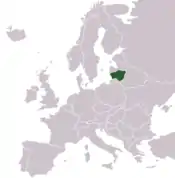Lietuva
Latvian

Lietuva (Eiropā)

Lietuvas karogs
Etymology
From the same stem as leitis (“Lithuanian”) (q.v.): *leit-, from which also liet (“to pour”), lietus (“rain”)) (q.v.). First mentioned in Annals of Quedlinburg as (Litua, from an earlier *Lētuvā, apparently from *leit- with a suffix (perhaps + -uve). Cognates include Lithuanian Lietuvà.[1] More information at Name of Lithuania.
Pronunciation
- IPA(key): /ˈliɛtuva/
| (file) |
Proper noun
Lietuva f (4th declension)
Declension
Declension of Lietuva (4th declension)
| singular (vienskaitlis) | plural (daudzskaitlis) | |
|---|---|---|
| nominative (nominatīvs) | Lietuva | — |
| accusative (akuzatīvs) | Lietuvu | — |
| genitive (ģenitīvs) | Lietuvas | — |
| dative (datīvs) | Lietuvai | — |
| instrumental (instrumentālis) | Lietuvu | — |
| locative (lokatīvs) | Lietuvā | — |
| vocative (vokatīvs) | Lietuva | — |
Synonyms
Related terms
References
- Karulis, Konstantīns (1992) “lietuvieši”, in Latviešu Etimoloģijas Vārdnīca (in Latvian), Rīga: AVOTS, →ISBN
Lithuanian
Etymology
From an earlier *Lētuvā, possibly from an earlier *Lietā or *Lētā with the suffix + -uva, denoting a region (see Sūduva, *Jotuva (“region of the Yotvingians”)).
Further etymology uncertain and debated, with several proposed etymologies:
- Most commonly, believed to have originated from the rivulet Lietauka from Old Lithuanian *Lietavà. Its etymology is unclear, but the root liet- likely comes from Proto-Balto-Slavic *l(e/o)ʔi-, ultimately from the Proto-Indo-European root *ley- (“to flow, pour, stream; to glide, slip, be slippery”), and is cognate with lietus (“rain”), lieti (“to pour”). It is an 11-kilometer-long rivulet in central Lithuania. According to Kazimieras Kuzavinis, this rivulet may have given its name to the surrounding territory, which includes nearby Kernavė, a medieval capital of Lithuania, and gradually expanded to become a name for the medieval Lithuanian state.
- According to Jan Otrębski, from an old name of the Neman river, *Leitā, attested in Alytus, from Old Lithuanian *Leitā (“city on the Leita river”).
- According to Simas Karaliūnas, from Old Lithuanian *lietā (“army, armed force”), from lieti (“to cast metal”), ultimately from the Proto-Indo-European root *ley- (“to flow, pour”).
- According to Artūras Dubonis, from leitis (“member of a social group in service of the monarch in Medieval Lithuania”).
Popular etymologies connect it with lietus (“rain”).
Pronunciation
- IPA(key): /lʲiətʊˈvɐ/
Declension
Descendants
- → Georgian: ლიეტუვა (lieṭuva)
See also
- Lietova (Samogitian)
See also
- (countries of Europe) Europos šalys; Airija, Albanija, Andora, Armėnija, Austrija, Azerbaidžanas, Baltarusija, Belgija, Bosnija ir Hercegovina, Bulgarija, Čekija, Danija, Estija, Graikija, Gruzija, Gudija, Islandija, Ispanija, Italija, Jungtinė Karalystė, Juodkalnija, Kazachstanas, Kipras, Kroatija, Latvija, Lenkija, Lichtenšteinas, Lietuva, Liuksemburgas, Makedonija, Malta, Moldavija, Monakas, Nyderlandai, Norvegija, Portugalija, Prancūzija, Rumunija, Rusija, San Marinas, Serbija, Slovakija, Slovėnija, Suomija, Švedija, Šveicarija, Turkija, Ukraina, Vatikanas, Vengrija, Vokietija
Further reading
- Name of Lithuania in the National Lithuanian Encyclopedia
- Kuzavinis K., Lietuvos vardo kilmė // Lietuvos TSR aukštųjų mokyklų darbai. Kalbotyra, t. 10 (1964), p. 5−18, t. 17 (1967), p. 135−137.
- Dubonis, Artūras (1998). Lietuvos didžiojo kunigaikščio leičiai: iš Lietuvos ankstyvųjų valstybinių struktūrų praeities (in Lithuanian). Vilnius: Lietuvos istorijos instituto leidykla. p. 15.
Northern Sami
Pronunciation
- (Kautokeino) IPA(key): /ˈlie̯tʰuːva/
Declension
| Even a-stem, no gradation | ||||||||||||||||||||||
|---|---|---|---|---|---|---|---|---|---|---|---|---|---|---|---|---|---|---|---|---|---|---|
| Nominative | Lietuva | |||||||||||||||||||||
| Genitive | Lietuva | |||||||||||||||||||||
| Singular | Plural | |||||||||||||||||||||
| Nominative | Lietuva | — | ||||||||||||||||||||
| Accusative | Lietuva | — | ||||||||||||||||||||
| Genitive | Lietuva | — | ||||||||||||||||||||
| Illative | Lietuvii | — | ||||||||||||||||||||
| Locative | Lietuvas | — | ||||||||||||||||||||
| Comitative | Lietuvain | — | ||||||||||||||||||||
| Essive | Lietuvan | |||||||||||||||||||||
| ||||||||||||||||||||||
This article is issued from Wiktionary. The text is licensed under Creative Commons - Attribution - Sharealike. Additional terms may apply for the media files.